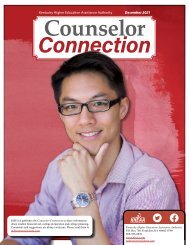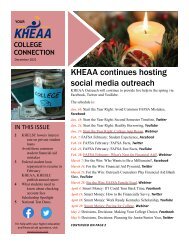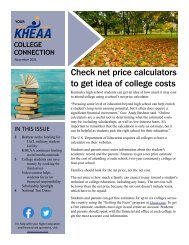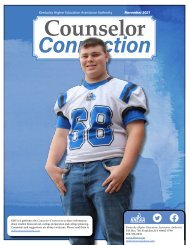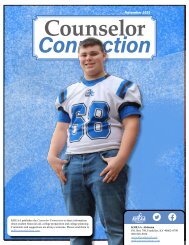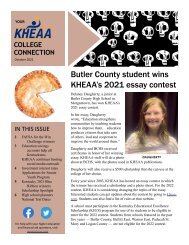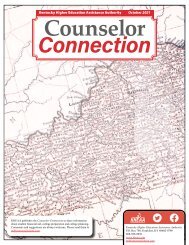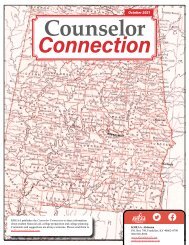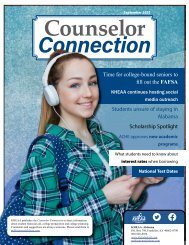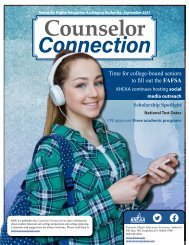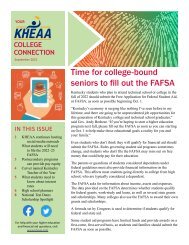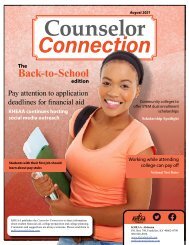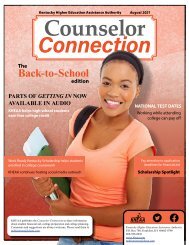You also want an ePaper? Increase the reach of your titles
YUMPU automatically turns print PDFs into web optimized ePapers that Google loves.
YOUR<br />
COLLEGE<br />
CONNECTION<br />
<strong>November</strong> <strong>2020</strong><br />
Winner of KHEAA’s <strong>2020</strong><br />
essay contest announced<br />
Tyler Wheatley, a junior at Bullitt<br />
East High School in Mount<br />
Washington, has won KHEAA’s<br />
<strong>2020</strong> essay contest.<br />
IN THIS ISSUE<br />
2 - KHEAA continues hosting<br />
social media outreach<br />
2 - Parts of ‘Getting in’ available<br />
in audio<br />
3 - Students should know these<br />
financial aid terms<br />
3 - High school planners<br />
4 - Students can enter financial<br />
literacy video contest<br />
5 - Students should learn more<br />
about credit scores<br />
5 - Scholarship Spotlight<br />
6 - National test dates<br />
6 - Somerset plans new four-year<br />
university<br />
In his essay, Wheatley wrote,<br />
“Living in poverty limits children’s<br />
ability to learn and contribute to<br />
the community… People who lack<br />
education struggle financially,<br />
often have poor health and have<br />
higher unemployment rates.<br />
Education creates stable and safe<br />
communities.”<br />
Wheatley and Bullitt East received<br />
certificates in honor of his winning<br />
essay. If school officials deem it<br />
safe to do so, KHEAA staff will do<br />
a photo shoot at Bullitt East, with<br />
the photos used in KHEAA publications.<br />
Tyler Wheatley of Bullitt East High School<br />
in Mount Washington won the <strong>2020</strong><br />
KHEAA scholarship essay contest.<br />
Wheatley will also receive a $500 scholarship that he can use at the<br />
college of his choice.<br />
For help with your higher education<br />
and financial aid questions, visit<br />
www.kheaa.com.
2<br />
KHEAA continues hosting<br />
social media outreach<br />
KHEAA Outreach will<br />
continue to provide live help<br />
in <strong>November</strong> and December<br />
via Facebook, Twitter and<br />
Instagram. Some sessions<br />
will include Kentuckyspecific<br />
as well as general<br />
information. The schedule is:<br />
• Nov. 17: Next Steps <strong>November</strong>: Checking In,<br />
Facebook<br />
• Nov. 18: Next Steps <strong>November</strong>: Navigating<br />
Verification, Twitter<br />
• Nov. 19: Next Steps <strong>November</strong>: Keeping Up Over<br />
Break, Instagram<br />
• Dec. 1: Considering Your Options: Certificates,<br />
Diplomas, and Associate Degrees, Facebook<br />
• Dec. 2: Considering Your Options: Bachelor’s<br />
Degrees and Beyond, Twitter<br />
• Dec. 8: Winter Break: KHEAA’s Holiday Party,<br />
Facebook<br />
• Dec. 9: Winter Break: What to do Over Break,<br />
Twitter<br />
• Dec. 10: Winter Break: Exploring Student Aid<br />
with KHEAA, Instagram<br />
All sessions begin at 3 p.m. Eastern, 2 p.m. Central.<br />
The links are:<br />
www.facebook.com/KHEAA/<br />
www.twitter.com/KHEAA<br />
Parts of ‘Getting In’<br />
available in audio<br />
Parts of two chapters of the newest edition of “Getting<br />
In,” the state’s college planning guide, are now<br />
available in audio on kheaa.com<br />
The audio versions include Chapter One and the<br />
first part of Chapter Two. Chapter One is a guide to<br />
college admissions, while the first part of Chapter<br />
Two helps students and parents navigate the financial<br />
aid process.<br />
People who access the audio version can listen to<br />
the complete chapter-long recordings or to separate<br />
sections that deal with specific topics, such as<br />
planning for college or finding financial aid.<br />
To listen to the audio version of “Getting<br />
In,” visit kheaa.com/website/kheaa/<br />
planning?main=6&display=ky_gettingin.<br />
www.instagram.com/kheaaoutreach/?hl=en
Students should know<br />
these financial aid terms<br />
As high school seniors and their parents begin the<br />
college financial aid process, they should know these<br />
terms.<br />
• Conversion scholarship/loan. This type of<br />
scholarship requires students to provide certain<br />
services. If they don’t provide the service, the<br />
scholarship becomes a loan.<br />
• Cost of attendance. The total cost of one year<br />
of college: tuition, fees, room, meals, supplies,<br />
transportation and personal items.<br />
• Expected family contribution. The EFC is the<br />
amount the student and family are expected to pay<br />
for the student’s education. It is based on a formula<br />
set by Congress.<br />
• FAFSA. The Free Application for Federal Student<br />
Aid must be submitted by students applying for<br />
federal and state aid. The best way to do so is at<br />
https://studentaid.ed.gov/sa/fafsa.<br />
• Financial need. The difference between the cost<br />
of attendance and the EFC.<br />
• Institutional aid. The scholarships, grants and<br />
other financial aid programs provided by the<br />
college.<br />
High school planners<br />
Seniors<br />
December/January<br />
Make sure your applications were received on<br />
time. <br />
If you applied for Early Decision and were<br />
accepted, withdraw your applications from other<br />
schools.<br />
• Verification. The process of making sure the<br />
information submitted on the FAFSA is correct.<br />
The federal government requires colleges to have<br />
a certain number of students’ FAFSA information<br />
verified.<br />
3
4<br />
Students grades 5–12<br />
can enter financial<br />
literacy video contest<br />
Students in grades 5–12 can enter the Kentucky<br />
Jump$tart Coalition’s 2021 Kentucky Saves Week<br />
video contest. The deadline to enter is Dec. 18.<br />
Entries are divided into four grade levels:<br />
• grades 5 and 6,<br />
• grades 7 and 8,<br />
• grades 9 and 10, and<br />
• grades 11 and 12.<br />
The first-place winner in each level will receive a $50<br />
grand prize. Winning videos will be displayed on<br />
various social media platforms.<br />
The contest is open to individuals, classes and<br />
non-school groups. However, entries must be from<br />
Kentucky students.<br />
Entrants can choose one of the following themes:<br />
• financial responsibility,<br />
• saving for college,<br />
• money management,<br />
• planning for your future,<br />
• using money wisely, or<br />
• personal finance.<br />
Videos should be no more than 3 minutes long.<br />
Videos must be original work and cannot infringe<br />
upon the rights of any third party, including copyright,<br />
trademark or privacy. Judging is based on theme (40<br />
percent), style and content (30 percent) and creativity<br />
(30 percent).<br />
The entry form can be accessed using the QR code to<br />
the right.
Students should learn<br />
more about credit scores<br />
Students should become familiar with their credit<br />
scores. Your credit score is a three-digit number that<br />
has a long-lasting effect on your buying power.<br />
“It’s important for young people to learn about<br />
financial concepts like credit scores early, before they<br />
make major financial decisions as adults,” said Gov.<br />
Andy Beshear. “A good credit score can open doors,<br />
but a bad one can make all transactions or loans more<br />
difficult and expensive.”<br />
Although there are several scoring methods, the most<br />
widely accepted one comes from FICO. Your FICO<br />
score ranges from 300 to 850. These items make up<br />
your FICO score:<br />
• 35 percent is based on your payment history. Early<br />
payments will have a higher number than on-time<br />
payments, which will have a higher score than late<br />
payments.<br />
• 30 percent is based on outstanding debt. This<br />
outstanding debt is how much you owe on car<br />
loans, mortgages, credit cards, etc. The number<br />
of credit cards you have and if those cards are<br />
near the maximum borrowing limit will hurt your<br />
score.<br />
• 15 percent is based on the length of time you have<br />
had credit. The longer you have been borrowing<br />
money and paying it back in a timely manner, the<br />
better your score.<br />
Scholarship Spotlight<br />
Kentucky PTA<br />
Eligibility: Must be a Kentucky high school<br />
graduating senior, attend a high school with a PTA/<br />
PTSA, plan to attend an accredited Kentucky college<br />
or university and plan to pursue a degree in education.<br />
Consideration given to financial need, academic<br />
achievement, personal remarks, career plans and<br />
involvement in school and community service.<br />
Award: $5,000<br />
Number: 1 to 5<br />
Deadline: February 15<br />
Contact: Kentucky PTA, 148 Consumer Lane,<br />
Frankfort, KY 40601; 502.226.6607; kentuckypta@<br />
bellsouth.net; www.kypta.org<br />
• 10 percent is based on new credit. If you have<br />
opened several new accounts, that will have a<br />
negative effect on your score. Also, the more<br />
inquiries on your credit report in a year, the lower<br />
your score.<br />
• 10 percent is based on the types of credit you<br />
currently have. It helps to have a mix of loan<br />
types. If you have a credit card, an installment<br />
loan will even out the credit.<br />
5
6<br />
ACT National Test Dates<br />
Test Date Registration Deadline Scores Available<br />
Feb. 6, 2021 Jan. 8, 2021 TBD<br />
April 17, 2021 March 12, 2021 TBD<br />
June 12, 2021 May 7, 2021 TBD<br />
SAT National Test Dates<br />
March 13, 2021 Feb. 12, 2021 March 26, 2021<br />
May 8, 2021 April 8, 2021 May 21, 2021<br />
June 5, 2021 May 6, 2021 July 14, 2021<br />
Somerset plans new four-year university<br />
Somerset community leaders have announced plans to<br />
develop a new liberal arts undergraduate university in<br />
the heart of its downtown.<br />
The University of Somerset will be a private four-year<br />
school. It plans to offer degree programs in artificial<br />
intelligence, homeland security, nanotechnology,<br />
and data science, as well as traditional offerings in<br />
English, education, math and other fields. Plans are to<br />
offer some master’s and doctoral programs as well.<br />
“This is critical for the future of Somerset. This<br />
is critical for the future of our region and our<br />
Commonwealth,” said Somerset Mayor Alan Keck,<br />
a member of the university’s founding board of<br />
directors. “We will demand complex ideas and unique<br />
discussion. This university will empower spirited<br />
leaders and thinkers and transform this community.”<br />
Keck said the university will enhance progress that<br />
has already been made in downtown Somerset.<br />
Tentative plans are to build the University of Somerset<br />
in Cundiff Square, an ailing nine-acre development<br />
downtown that was once a center of commerce and<br />
the site of Town Spring, where Somerset was founded.<br />
Keck said the success of the University of Somerset<br />
depends, in part, upon the community’s support,<br />
and in the coming weeks, residents will have the<br />
opportunity to learn more and get involved.<br />
A timeline for the university’s development will be<br />
announced in the coming months. University Vice<br />
President Michael Keck said organizers are in the<br />
fundraising stage and are welcoming donations. The<br />
university has been organized as a nonprofit and will<br />
launch its capital campaign in early 2021.<br />
Learn more about the University of Somerset at<br />
https://universityofsomerset.org/



